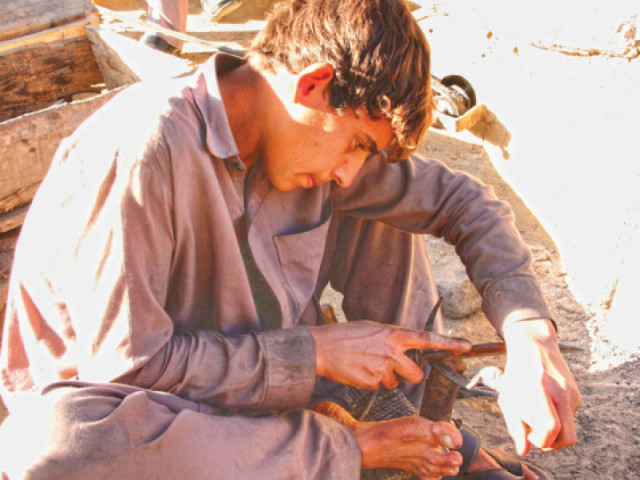Man of steel: Village smithy of Totai strikes while the iron is hot
At the age of 15, Khadim manages a blacksmith shop owned by his family.

At the age of 15, Khadim manages a blacksmith shop owned by his family. Still young, he believes that as long as the practice of sharpening knives, sickles and axes exists, a blacksmith’s job will never be done.
“I have studied till the fifth grade,” he tells The Express Tribune. “However, when my family could no longer afford to educate me, I decided to help them run the shop.”
Every day, Khadim and his father sit next to their traditional furnace under a tree and begin work. Throughout the day, they use their tools to shape metal and create objects.
“I have become a master in the trade and can make every object which is used by villagers,” he says, not without pride. According to Khadim, they usually sharpen knives, sickles and axes as these objects are used frequently by villagers.

Scraping through
Over the years, Khadim’s father has grown old and cannot work as efficiently as he used to. Consequently, Khadim had to step in and seize the reins. However, it hasn’t always been smooth-sailing for him. Khadim’s family consists of 15 people. With so many mouths to feed, it is increasingly difficult for the family’s needs to be fulfilled.
“In the past, villagers would give us ration in exchange for our services,” he explains. “However, we now charge money for our work.”
According to Khadim, they charge Rs30 to sharpen a knife and sickle and Rs40 for an axe. “We can earn between Rs100 to Rs500 a day,” he says. “During Eidul Azha and crop-cutting season, our daily income increases to Rs1,000 a day,” he said.
Nevertheless, the young blacksmith views his work as a labour of love.
“I am satisfied as I earn enough to feed my family,” he says. “My forefathers did the same job and I’m proud that I am continuing their legacy.” Fortunately, Khadim has not had to make too many sacrifices for his family.
“My daily pocket money is Rs50 which I use to buy sweets,” he says, with a broad smile on his face.
A matter of convenience
The shop’s furnace is a popular spot where villagers congregate in the evenings to chat. Situated in an open field, it can be accessed by all and sundry. However, nobody steals their tools and equipment.
“Once a villager stole our water pot,” Khadim says, “The same night his charpoy flipped over as he was asleep.”
After the incident, nobody dared to steal from the blacksmith shop. They saw it as a divine message, a warning not to disrupt the family’s business.
Khadim has never stepped out of his village and travelled to other parts of the country. The furthest he has gone is Dargai Bazaar from where he buys coal for his furnace.
Lehaz, a village elder, says the family’s blacksmith shop serves as welcome proof that not all indigenous trades have fallen out of favour.
“The bazaar is far away from the village so we cannot always go buy knives from the market,” he explains. “The blacksmith shop has helped us a great deal.”
Published in The Express Tribune, December 17th, 2014.



















COMMENTS
Comments are moderated and generally will be posted if they are on-topic and not abusive.
For more information, please see our Comments FAQ